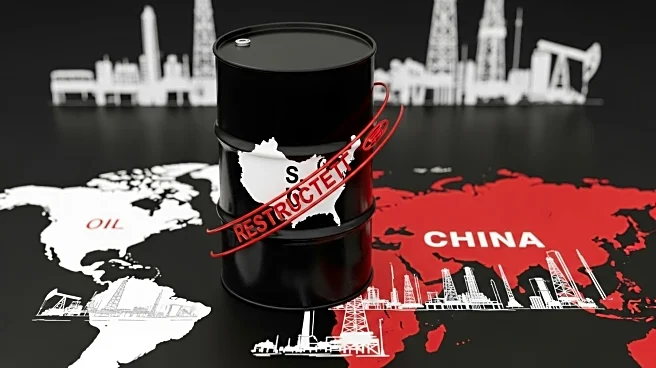What's Happening?
The United States has imposed new sanctions targeting Iranian petroleum exports, significantly affecting China's Sinopec, a major player in the global refining industry. These sanctions focus on a terminal in Shandong province, which handles a substantial portion of Sinopec's crude oil imports. The terminal, Rizhao Shihua Crude Oil Terminal Co. Ltd, is partly owned by Sinopec Kantons Holding and has been designated for receiving Iranian oil on sanctioned vessels. This move is part of the U.S.'s ongoing efforts to restrict Iran's oil trade, particularly with its largest customer, China. The sanctions come ahead of planned talks between President Trump and Chinese President Xi Jinping, further complicating U.S.-China relations.
Why It's Important?
The sanctions have significant implications for Sinopec and the broader oil market. Sinopec, which imports a large volume of crude oil through the Rizhao terminal, may face operational disruptions and increased costs as it seeks alternative ports for its shipments. This could lead to logistical challenges and potential production cuts at major subsidiary refineries connected to the terminal. The sanctions also reflect the U.S.'s strategic efforts to exert pressure on Iran by targeting its oil exports, which are crucial for the Iranian economy. Additionally, the move could exacerbate tensions between the U.S. and China, impacting diplomatic relations and trade negotiations.
What's Next?
Sinopec may need to redirect its oil shipments to other facilities, such as Ningbo or Qingdao ports, to maintain supply to its refineries. The company might also increase throughput at nearby plants to offset potential production cuts. The sanctions could lead to congestion or discharge delays at alternative ports, affecting freight rates and shipping logistics. As the situation develops, industry stakeholders will closely monitor the impact on oil prices and market dynamics. The upcoming talks between President Trump and President Xi Jinping may address these tensions, potentially influencing future diplomatic and trade policies.
Beyond the Headlines
The sanctions highlight the geopolitical complexities of global oil trade and the strategic use of economic measures in international relations. They underscore the vulnerability of companies like Sinopec to political decisions and the need for diversified supply chains. The situation also raises questions about the long-term sustainability of relying on sanctioned sources for energy needs and the potential shifts in global oil market dynamics.








